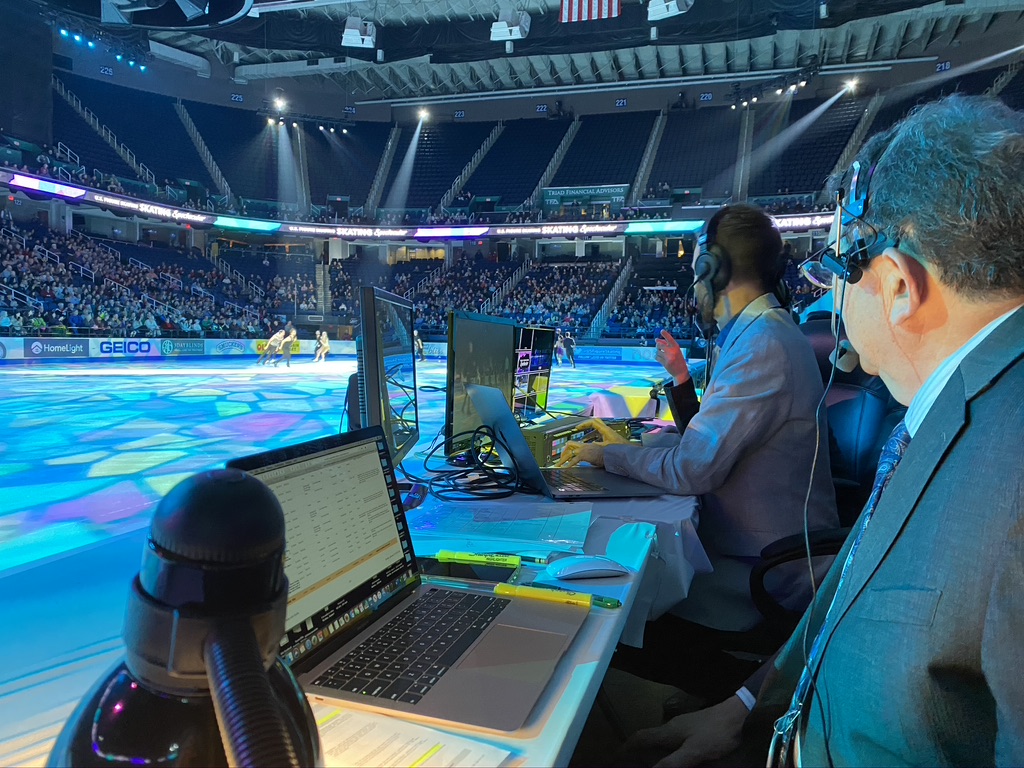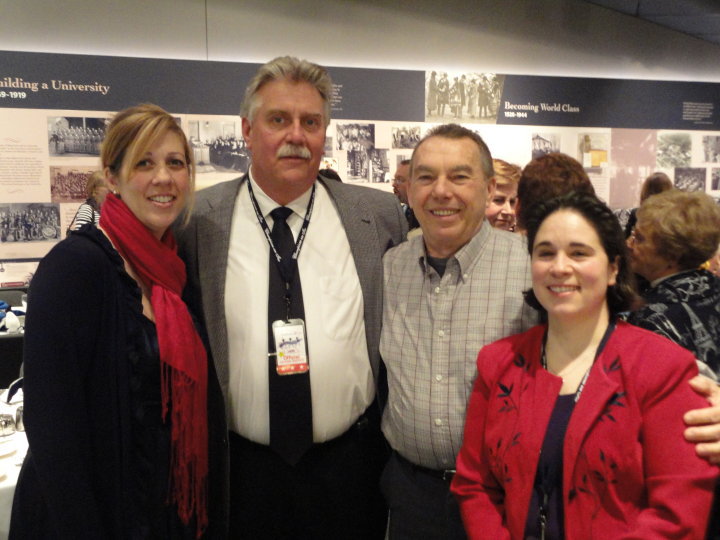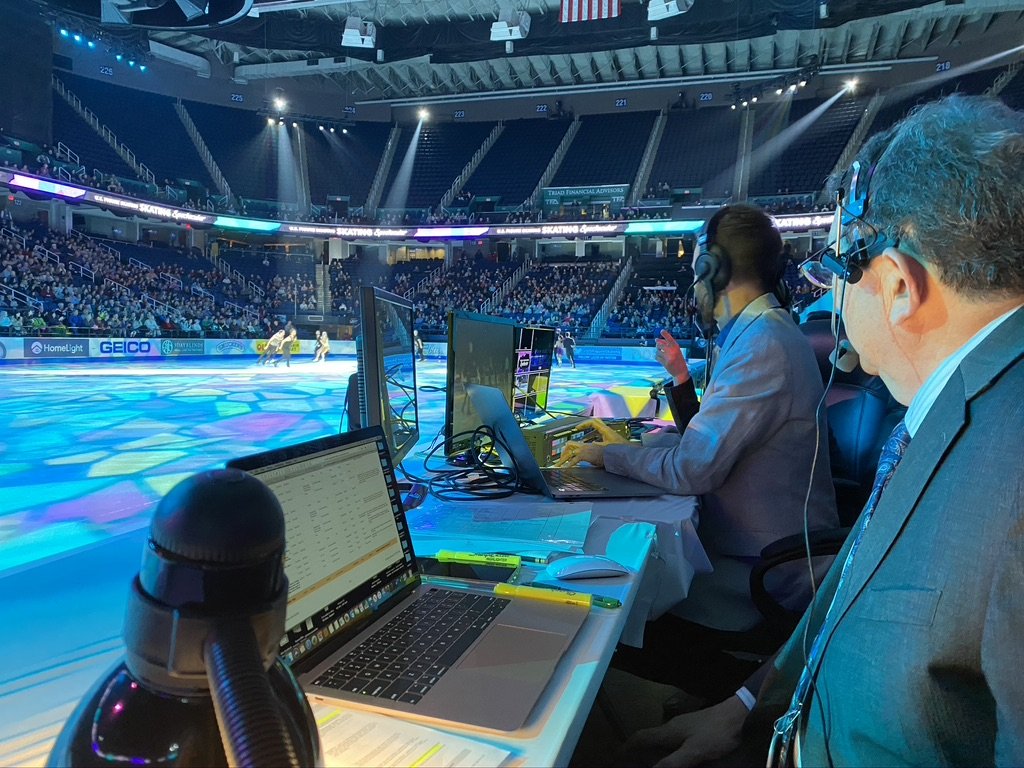By Lexi Rohner
Jim Webb, a Lake Placid, New York, skater and now judge, remembered what it was like sitting behind the microphone for the first time at the 1979 New England Regional Championships in Boston.
Bob Mack, the Tom Collins’ ice show emcee, Lake Placid radio DJ and lone U.S. Figure Skating announcer at the time, offered Webb a chance to introduce the skaters. Intrigued but intimidated by public speaking, Webb seized the opportunity. Within a year, he was announcing at the U.S. Championships. For the next five years, he paid his own expenses to work U.S. Figure Skating’s marquee event.
After 28 U.S. Championships, Webb recalled the advent of announcer development.
"We were fortunate to have Harry Gleeson join us in Washington, D.C., in 1978 with 30-plus years of live audience announcing experience, and create scripts,” Webb, an announcer of four World Championships, said. “Anything good with my announcing I owe to Harry.”
Experience has naturally shaped Webb’s skill, comfort and perspective on the mic.

“It’s not an arena full of people,” Webb said. “It’s a conversation with one person.”
“When I was brought into skating it was a different challenge,” Gleeson, a non-skater, said in 2017. “I hope for increased professionalism at all levels as we provide professional sound.”
Gleeson passed away in 2018.
1980s
As announcing became established, past U.S. Figure Skating president Ron Hershberger was counted among the ranks.
“I began helping my club (St. Moritz ISC), and obtained a sectional appointment,” Hershberger said. “I learned that organization, being prepared and not being easily distracted are crucial to doing a good job. Engaging audiences make the events fun for the skaters. It was a great experience.”
After 15 years, Hershberger curtailed announcing upon becoming president.
1990s
Charles Robel contacted Gleeson in 1994. Paying his own expenses to the U.S. Championships, it was there where Robel became involved with announcing.
“I’ve been afforded such great opportunities,” said Robel, an announcer of several national and international events.
Complementing announcers are music coordinators like Don Rabbitt; Rabbitt also holds an announcing appointment.
“Delivering a good program for skaters with correct speed and tempo is vital,” Rabbitt said.
2000s
Webb was assigned to work the 2002 Olympic Winter Games with Carol Nugent.
“I aim to complement events with my best effort,” Nugent said. “Referees depend on announcers’ competition protocol knowledge to keep events moving.”
Those who have moved the job forward with their high-quality voices and professionalism include national announcers Mike McGuire, Patty Vicary, Jason King, Paula Ashen and Bob Richmond.
“In my 30 years of announcing, technology has improved,” McGuire said. “What hasn’t changed are the friendships and relationships you continue to develop.”
King brings high energy and his special brand of humor to the deck (front row).
“Relax and smile. Judge #1 is usually sitting next to you,” King said. “It’s like being sent to right field.”
Vicary brought her radio/voiceover background to the sport and counts herself fortunate for her mentors.
“I’m thrilled with the changes U.S. Figure Skating has implemented to further strengthen current and future announcers,” Vicary said.
“The announcer is the bridge between the officials, the skaters and the audience,” Richmond said.

Structure
As announcing has grown, so has interest in understanding this aspect of being an official. For many years, announcing was managed by a national vice chair on the Competitions Committee. With committee restructuring in 2019, the Domestic Official Recruitment/Management Committee (DORM) was established, along with a reshuffling of responsibilities for management of officials and a new and stronger focus on recruitment.
At present, there are vice chairs for announcing on three of four DORM subcommittees, including Wendy Sheridan handling management. Sheridan has connected with every appointed announcer and aims to communicate with clubs who need announcers for their qualifying events.
The Recruitment Subcommittee is represented by Lexi Rohner, and in anticipation of the announcer talent base growing, works with the group and Sheridan to create goals and pathways moving forward. Robel handles officials’ development.
"Announcing has moved into a new phase and it’s an exciting prospect to help lead it forward,” Sheridan said.
On the Job
Being on deck to announce is the best seat in the house, but it is vital to understand Webb’s number-one rule: “Announcers are not the talent. While it is a talent to be able to announce, the reason for being there is the competitors. Narrating the story on the ice is the job, providing the $1,000 ticket-holders with a $2,000 experience. Be professional, polished and always ask name pronunciations.”
Shocking moments can happen close to the action, as they did at the 2007 Four Continents Championships when Canadian pairs skater Jessica Dube’s face was cut by her partner’s blade.
“Fifteen feet from me, you couldn’t help but be stunned,” said Robel, who admitted he struggled to keep his composure.
An announcer’s biggest fear is saying the wrong words and leaving the microphone open. Henry Son, national announcer and longtime Ice Chips show emcee, is as enthusiastic as they come.
“My most embarrassing moment was introducing Brian Boitano as Brian Orser,” Son said. “Brian’s good humor turned it into the funniest incident in my career.”
Time is measured in events and ice cuts, often relying on announcers for information. Officials like judge Mary Ann Wilcox recognize announcers as a dedicated group of people.
"They are indispensable,” judge Mary Lou Rothman said.
A chief announcer begins working long before an event, organizing schedules and information in conjunction with the referee. If interested in becoming an announcer, ask yourself: Are you comfortable with public speaking? Are you able to get along with all officials and competition volunteers? Do you love watching skating? If so, visit usfigureskating.org/support/officiate.
Sharing a love for the sport with proficiency and enthusiasm, announcers help audiences understand and embrace the sport’s changes.
“It’s not about you but the athlete,” Webb said. “A great voice alone is not enough.”


